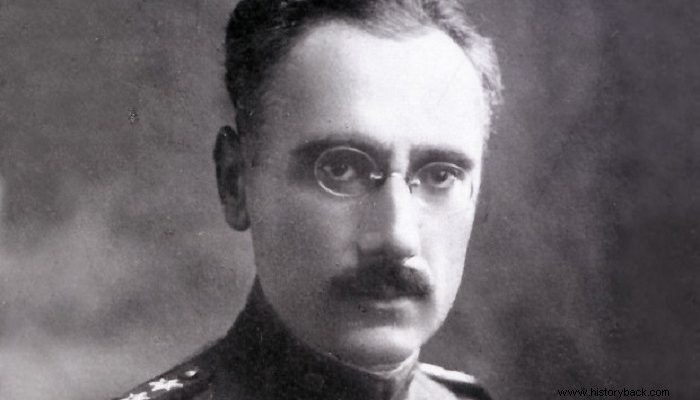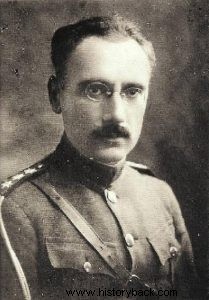
Greece is eating its children. This sad, general truth could not be true in the case of one of the great heroes of the Greco-Italian War of 1940-41 and not only, lieutenant colonel Mordochaios Frizis. Another forgotten hero of Greece, fellow fighter with the hunted Charalambos Katsimitros, with the also forgotten Vasilios Vrachnos, with Sotirios Moutousis, with the thousands of forgotten heroes of the Epic of the 1940s.
However, the case of Mordecai Frizis is somewhat different, as he was Jewish in religion, which did not help much in the later recognition of his action, not only in 1940, but in all national struggles, since 1912. Mordecai Frizis was born on January 1, 1893 in Chalkida. His mother came from the Crispi family, members of which were members of the Friendly Society and had fought in the Revolution of 1821 against the Turks.
Mordecai from an early age showed his inclination towards the military. However, not being able to overcome the prejudices of the time, he was not admitted to the Ewelpid School, although he passed the entrance exams with ease . However, he was admitted to the law school of the University of Athens. Although he successfully completed his studies, fate did not destined him to be a simple lawyer. Shortly before being called up to serve his term, he volunteered for NCO school, graduating with the rank of sergeant.
He fought in the Balkan Wars as a non-commissioned officer and distinguished himself for his courage and administrative skills. His value was appreciated by his superiors and he was admitted to the reserve officers' school in his hometown of Chalkida. He graduated from the school with the rank of reserve lieutenant. With this rank he acted on the Macedonian Front, where he distinguished himself.
With the end of World War I, Frizis was promoted to reserve lieutenant, by award. In October 1919 he was permanent in the army with the rank of second lieutenant. He was placed in the military court of Larissa, due to his legal studies. But he himself did not wish to be a lawyer, even in uniform. If he wanted to he could have done it already. He was a soldier and wanted to contribute to the country. So he asked to participate in the operation of the 1st Army Corps in Ukraine. There again he distinguished himself for his action.
With the end of the Ukrainian campaign, Frizis found himself on the new war front of Hellenism in the ancient Greek homeland of Ionia. And there Frizis fought with enthusiasm. It is worth noting that he was one of the few Greek officers who never got involved in politics, at a time when the division between Venizelians and Royalists was at its zenith. He maintained this attitude throughout his military life. He was a soldier of Greece, as he said, and not of this or that political or military leader. In Asia Minor, although a second lieutenant, he came to command a company.
He was especially loved by his men and respected by his superiors. His action was brilliant. That is why he was promoted to the rank of lieutenant and was awarded the Golden Medal of Valor. Earlier he had also been honored by the Russians with the Order of Saint Stanislaus after swords. In March 1922 he married Victoria Heim Costi from Volos. He stayed with her for a while after he had to go back to fighting.
He was found in Asia Minor during the Turkish offensive of August 1922. Along with thousands of others he was captured during the retreat of the army to Smyrna – he was the only non-Christian Orthodox officer in the Greek Army. Of course, this fact was learned by the Turks, but also by the Israeli community of Smyrna. The community immediately collected a respectable amount and gave it as "bakhtsis" to the Turks to free Frizis. The eternal Turks of course did not refuse , on the condition that he never fight against them again.
But when they approached the captured lieutenant, they were surprised. Frizis, not only did not accept to separate his fate from the rest of his fellow prisoners, but flatly rejected the offer of the Turks. "We Greeks are liberating ourselves", he answered them coldly. He was a Greek officer. He could not betray his beliefs, his country, his flag, his comrades in arms, to save himself. Dishonor was never characteristic of Greek officers. The soul of Frizis was Greek, so Greek, that we doubt whether the souls of many contemporaries, orthodox in name, can approach it, in beliefs or behavior.
Finally, Frizis was released in August 1923. He returned to Greece and was appointed deputy commander at the garrison of Volos. His commanding officer within two months recommended him for promotion, reporting to the administration:"Throughout the time, until now, he has shown zeal for the Service and excellent conduct. He has an encyclopedic education and is professionally fully qualified. He is honest, disciplined, studious." Thus, by default, Frizis was promoted in December 1923 to the rank of captain. He was also awarded the Medal of Military Valor 2nd class and the Military Cross 3rd class, for his action in Asia Minor.

